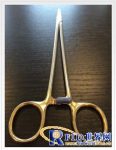
Danish hospital Rigshospitalet pilots RFID surgical instrument tracking system
[ad_1]
Hong Kong, April 2, 2015-The Rigshospitalet Hospital in Copenhagen, the capital of Denmark, implemented aRFIDSurgical instrument tracking program. The project leader, Dr. Henrik Eriksen, announced the results of the 18-month pilot last month: “In the past year, the use of RFID technology to track surgical instruments has helped shorten the surgical process by 31,000 working hours, while also improving the safety of patients’ medical treatment. The quality of control for disinfection and sterilization of instruments.”

Use the RFID reader to scan the tray prepared before the operation and record all the surgical instruments in the tray. In order to ensure the accuracy of counting, the reader will scan multiple times before the tray enters the operation. After the operation is completed, use the reader to scan the instrument again to confirm that no instrument is missing. The reader will also scan the instruments and record the disinfection process during the disinfection and sterilization process.
The RFID reader can read 60-80 instruments in a surgical tray at the same time. Rigshospitalet previously used QR codes to manage surgical instruments. Dr. Eriksen said: “Compared with QR codes and other types of RFID technology, UHF RFID has unparalleled advantages in reading speed and accuracy. Rigshospitalet Hospital is known for providing high-quality services to patients, leading the hospital Our technical strength allows us to realize the cost-effectiveness of tracking surgical instruments and optimizing work processes.”
The system used by Rigshospitalet was developed by Caretag Surgical, a medical RFID solution provider based in Copenhagen. Each surgical instrument is equipped with Dash XS passive UHF metal tags. The glue used to install the label is provided by Dana Lim A/S.
During the pilot project, the hospital found that the small labels installed on surgical instruments did not affect the use of surgical instruments. The label can withstand more than 1000 cycles of high temperature and high pressure steam sterilization, and most labels on the market cannot withstand such an environment.
The significance of the success of this pilot project is to improve the safety of medical treatment through automated tracking of surgical instruments, improve the traceability of surgical instrument management in the work process, and reduce costs by improving surgical efficiency. Rigshospitalet has approximately 75,000 operations per year, and the application of RFID has shortened the hospital’s 31,000 hours. This time refers to the surgical process that does not include the advantages of RFID in disinfection management and infection prevention, such as improving the safety of patients in medical treatment, preventing the loss of surgical assets, and so on.
“Hospitals are facing a surge in the number of operations but limited resources. This requires more urgent surgical instrument tracking management,” said Soren Bilsoe, founder of Caretag Surgical. “Caretag Surgical’s surgical instrument management system ensures that every operation is used. Appropriate equipment is obtained, and all equipment is accurately and automatically managed, and detailed files are established, such as the patient’s surgical information, surgeon, disinfection process, equipment location and use history, etc.”
[ad_2]



